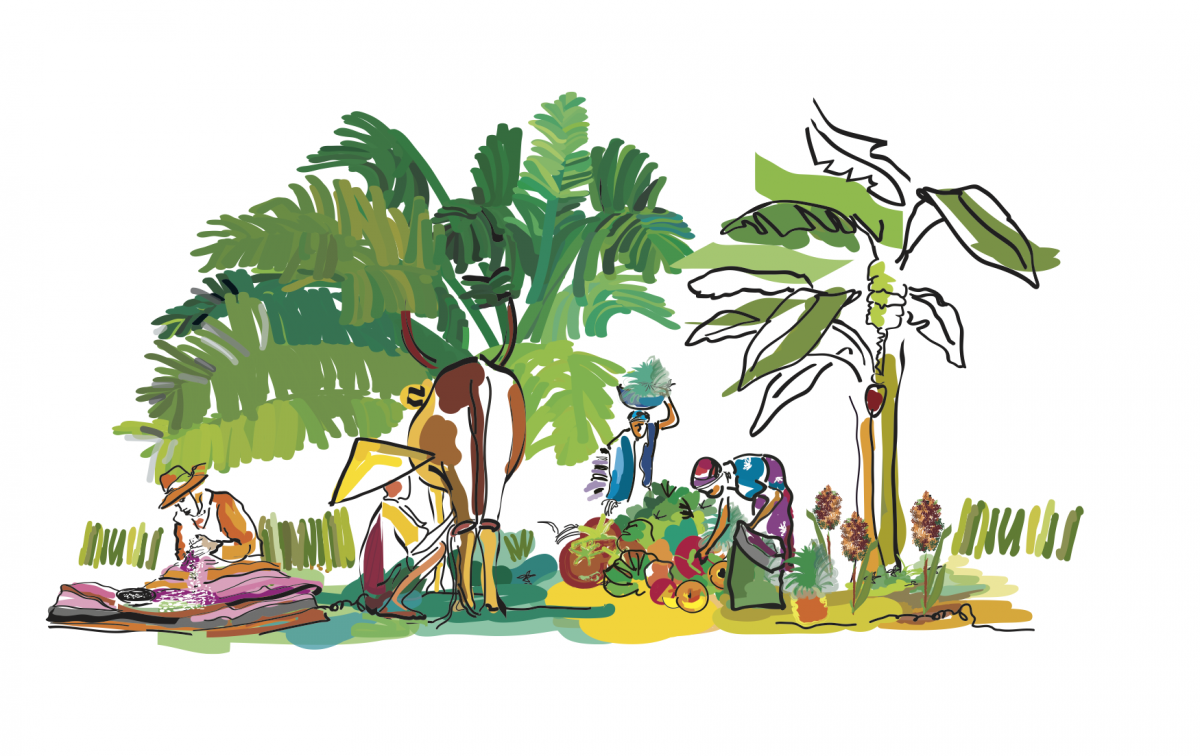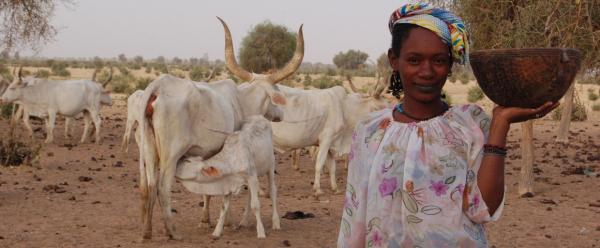Event 9 December 2025
- Home
- CIRAD news
- News
- SIA 2020 Conference: Reconciling food security and biodiversity
Reconciling food security and biodiversity: acting locally, thinking globally

© Delphine Guard, CIRAD
All videos in French...
“The impact on biodiversity of industrial agriculture in the North and the green revolution in the South initiated in the 1960s is now reaching critical levels”, said Michel Eddi, CIRAD’s President Managing Director, at the opening of the conference “Can we reconcile food security and biodiversity?”. “There is thus an urgent need to reduce all negative externalities of agriculture on the environment, and to mobilise this incredible, as yet free resource, biodiversity, in order to produce more and better”. Solutions do exist, but this transition to agroecology is set to be long and complex, since it is multifactorial. From seeds to consumption, we need to act locally and think globally.
Seeds: protecting and promoting local innovations
First, the goal is to protect the rights of farmers to their seeds. This is the objective of the International Treaty on Plant Genetic Resources for Food and Agriculture (ITPGRFA), signed in 2004 by almost 80 countries. It aims to protect and disseminate the diversity of seeds, while ensuring the fair and equitable sharing of benefits arising from their use. Its application is the responsibility of the governments of the signatory countries. However, in practice, “many farmers, who could be sources of innovation and the guardians of agrobiodiversity, especially in the countries of the South, are poorly informed, unrecognised, and their contribution to food security is undervalued. Protecting their rights therefore calls for international treaties to be adapted to the national level and the farm level”, says Juanita Chaves Posada, Senior Adviser on Genetic Resources for the Global Forum on Agricultural Research and Innovation (GFAR).
Producing differently: scientific agroecology
In terms of production, “recent studies show that the simplification of agricultural landscapes, through its impact on biodiversity, adversely affects agricultural production”, says Pierre-Marie Aubert from the Institute for Sustainable Development and International Relations (IDDRI). “The challenge today is therefore huge, because we need to increase the capacity to produce biomass to meet growing demand, at least without increasing agricultural areas [in order to avoid negative climate impacts, editor’s note], while restoring their biodiversity”.But, “yes, we will be capable of properly and sustainably feeding a growing population”, says Marc Dufumier, an agroecologist at AgroParisTech, and President of Commerce Equitable France. According to him, the solution is “the most extensive possible permanent plant cover to cover soils all year round”, which uses solar energy, nitrogen from the air, soil carbon, atmospheric water and rock minerals, through informed intercropping. However, “this transition must be based on scientific agroecology that studies the complexity and functioning of global agrosystems, from the plot level to the country level”, adds the ecologist.
Addressing the diversity and complexity of food products
The specialisation of agriculture also stems from the massification of food. To halt this phenomenon, there are several options. “Creating territorial networks of small rural agrifood companies makes it possible to produce local specificities and to promote know how”, suggests Nicolas Bricas, an agroeconomist at CIRAD, based on the French example of the “appellation d’origine contrôlée”, or protected designation of origin. Moreover, “the plasticity of processing tools should make it possible to address food products in all their diversity and complexity. Finally, concerning distribution, the alternative to the group purchasing organisation is the wholesale market, which sells far more varieties of a given product”, adds the economist.
Social and economic realities that are part of a globalised ecosystem
Reconciling biodiversity and food security certainly requires local solutions, but “agriculture and biodiversity are not just agronomy and biology. They are also social and economic realities that are part of a globalised ecosystem”, says Gilles Kleitz, Director of AFD’s Department of Ecological Transitions and Natural Resources. “The work of states, farmers’ organisations, donors and the Common Agricultural Policy is therefore to protect a certain localism, while benefiting from globalised agriculture and markets, without forgetting to place farmers’ life plans at the heart of this equation”.
“Moreover, there is not yet any funding to support more biodiversity-friendly agriculture. One of the challenges for COP15 Biodiversity and the European Green Deal will therefore be to develop new funding models, without which this transition will fail”, stresses Elisabeth Claverie de Saint-Martin, CIRAD’s Director General in charge of Research and Strategy. “This transition calls for a paradigm shift in the production-based agricultural model and leads us towards a new system which must be built from scratch and for which CIRAD is already providing its scientific expertise”.



























